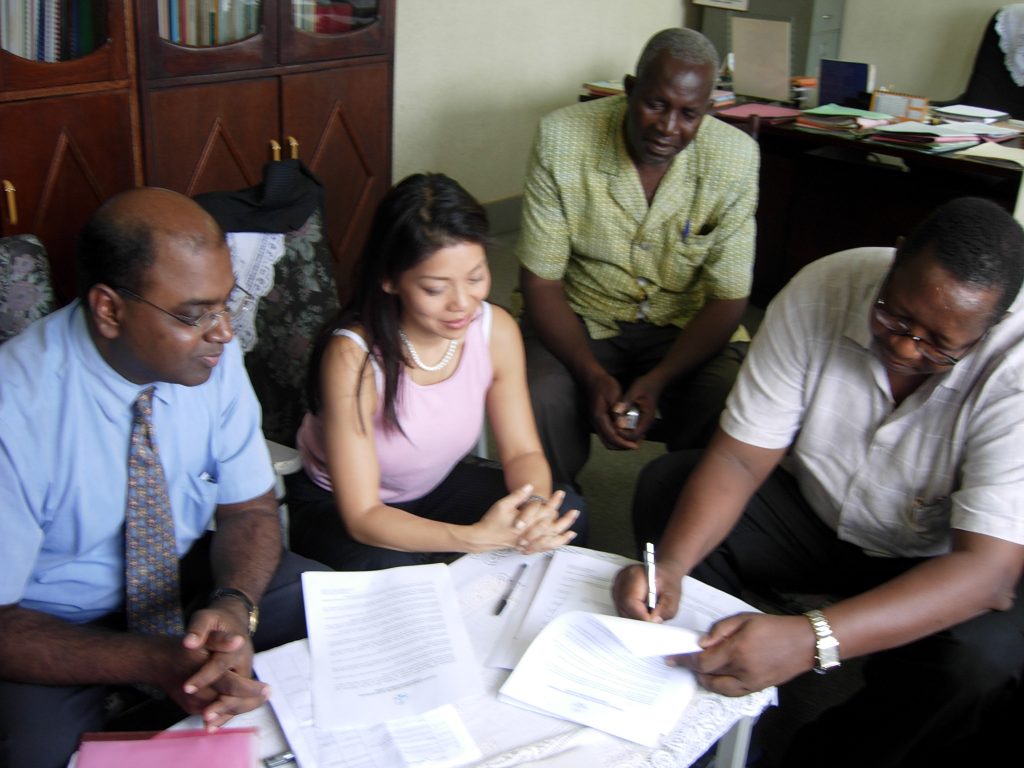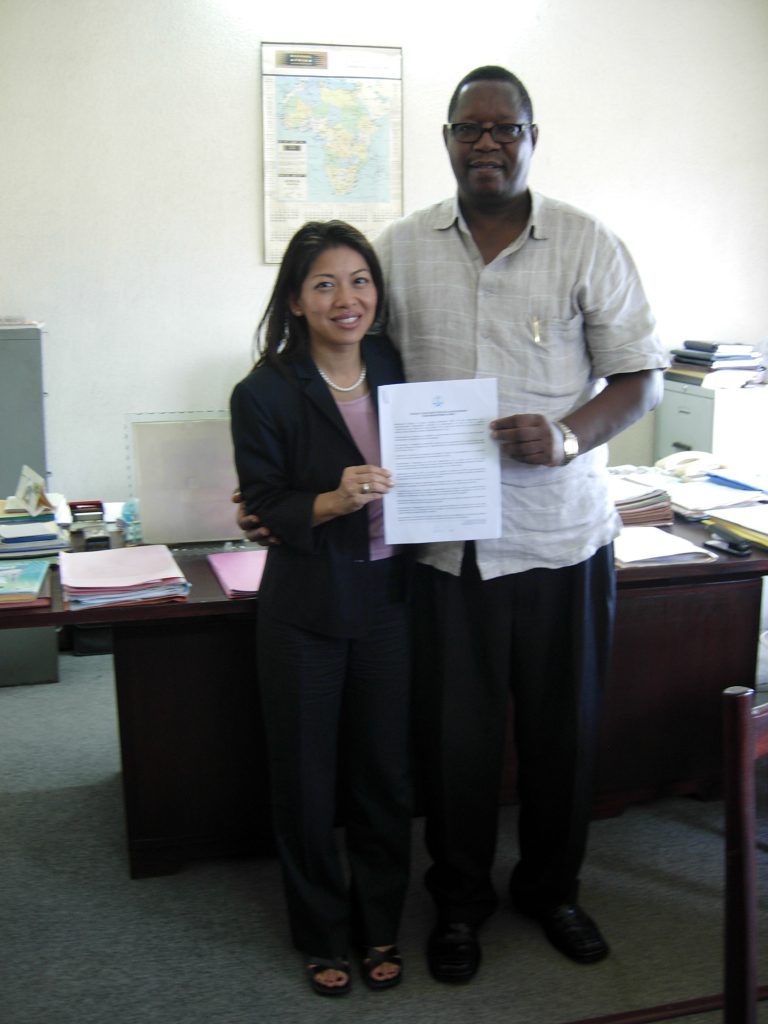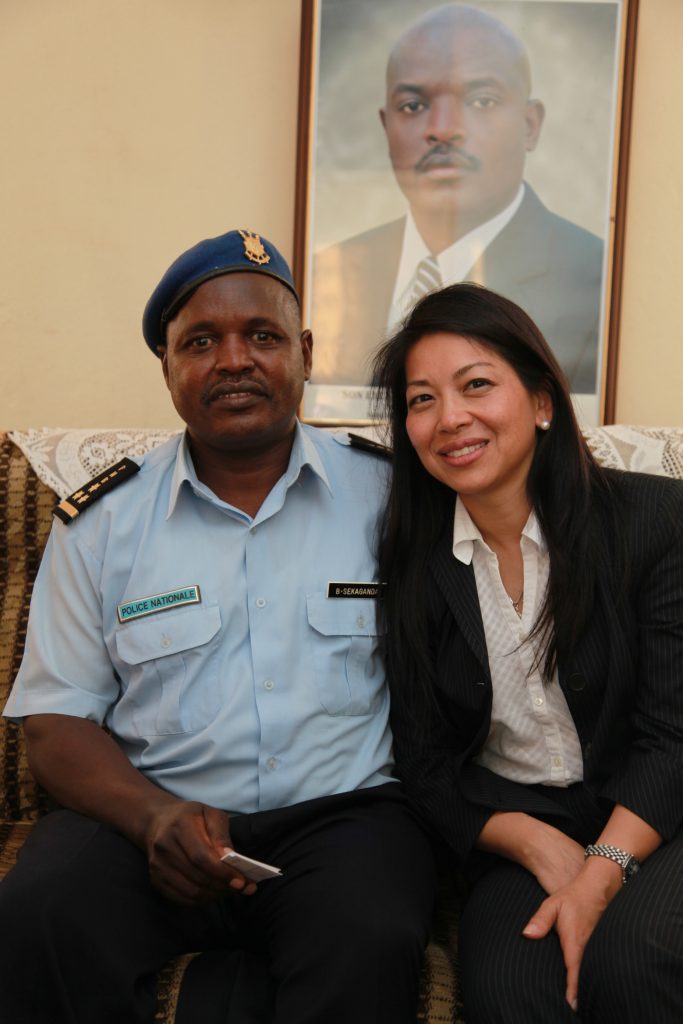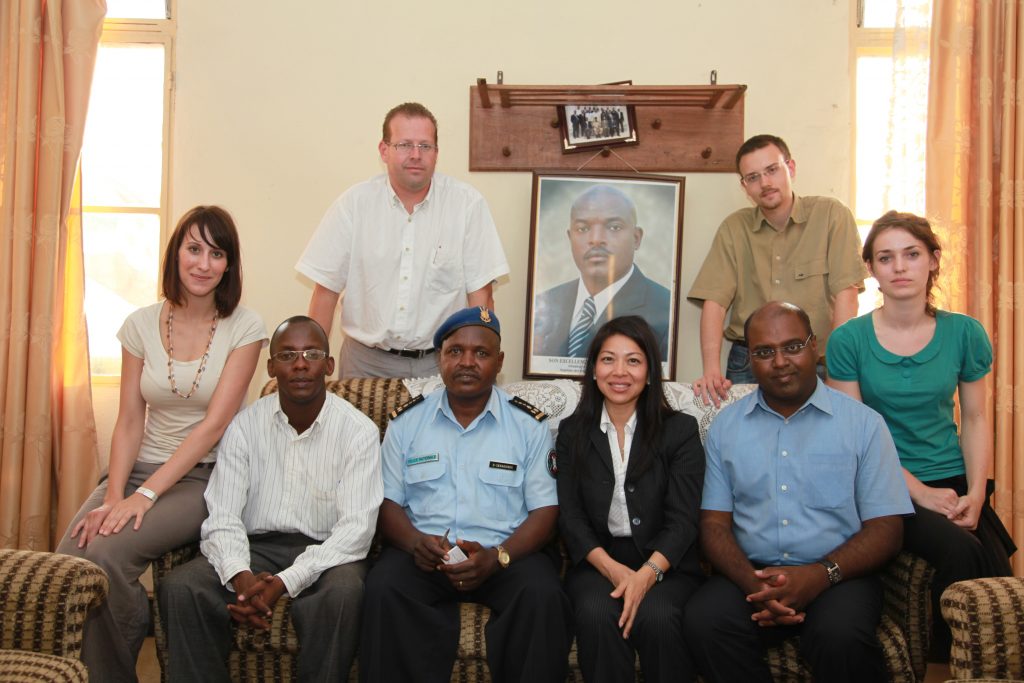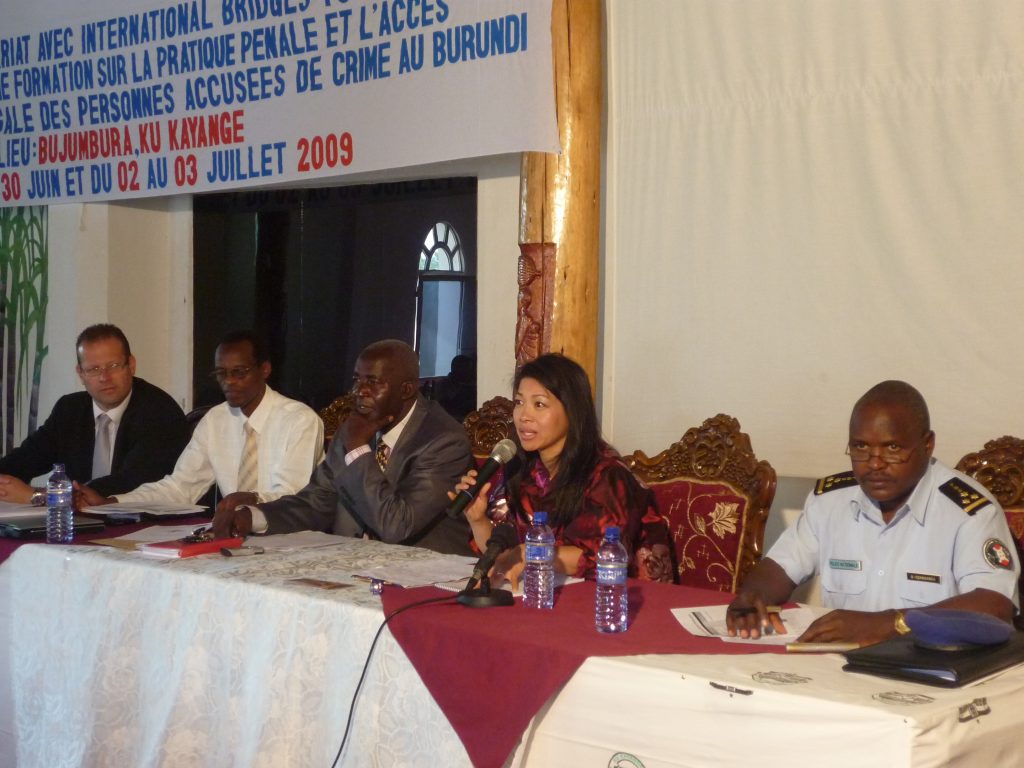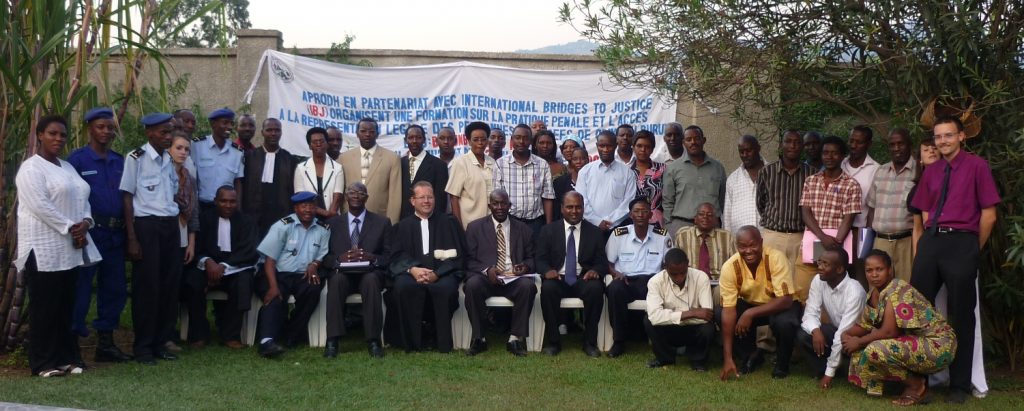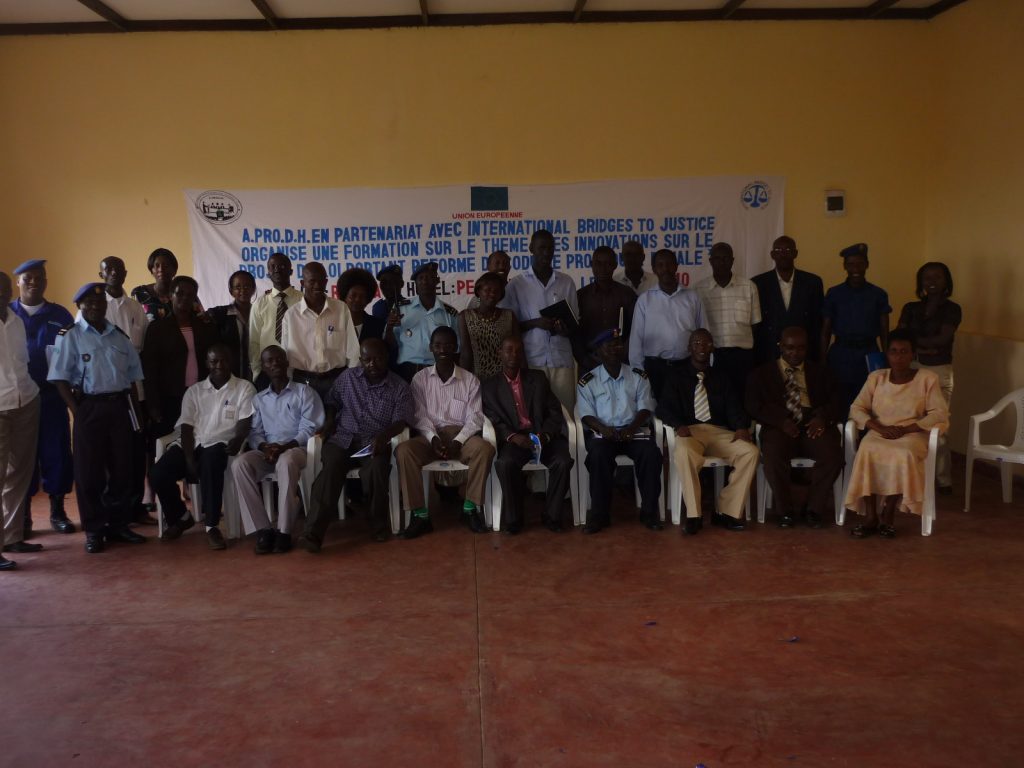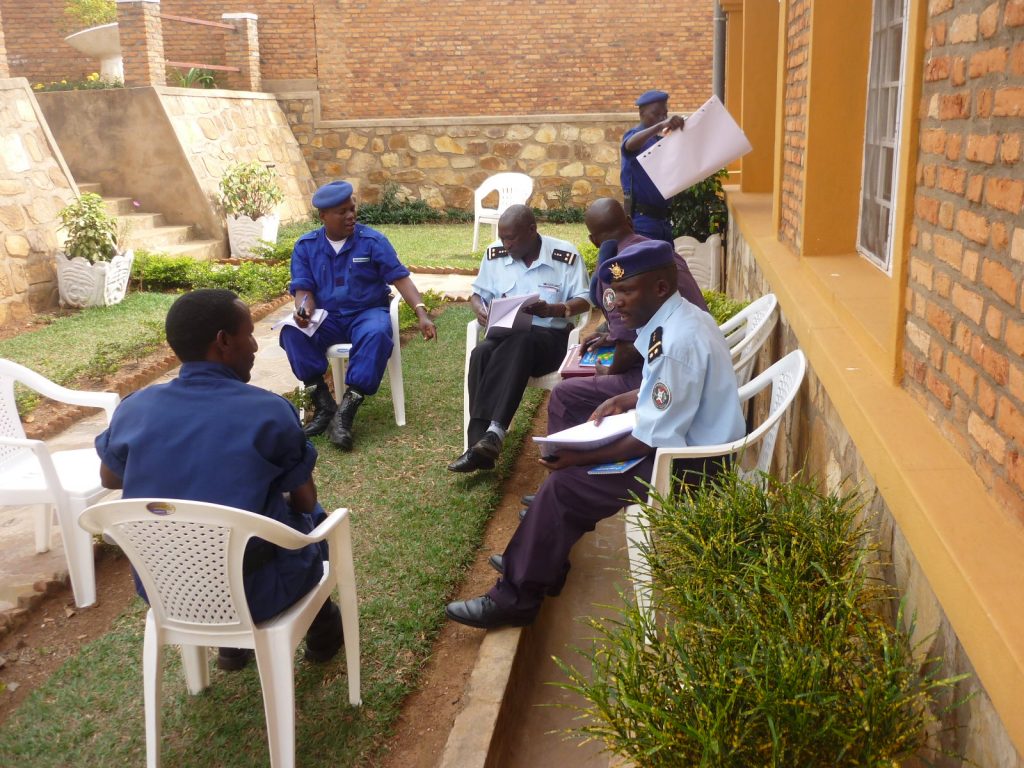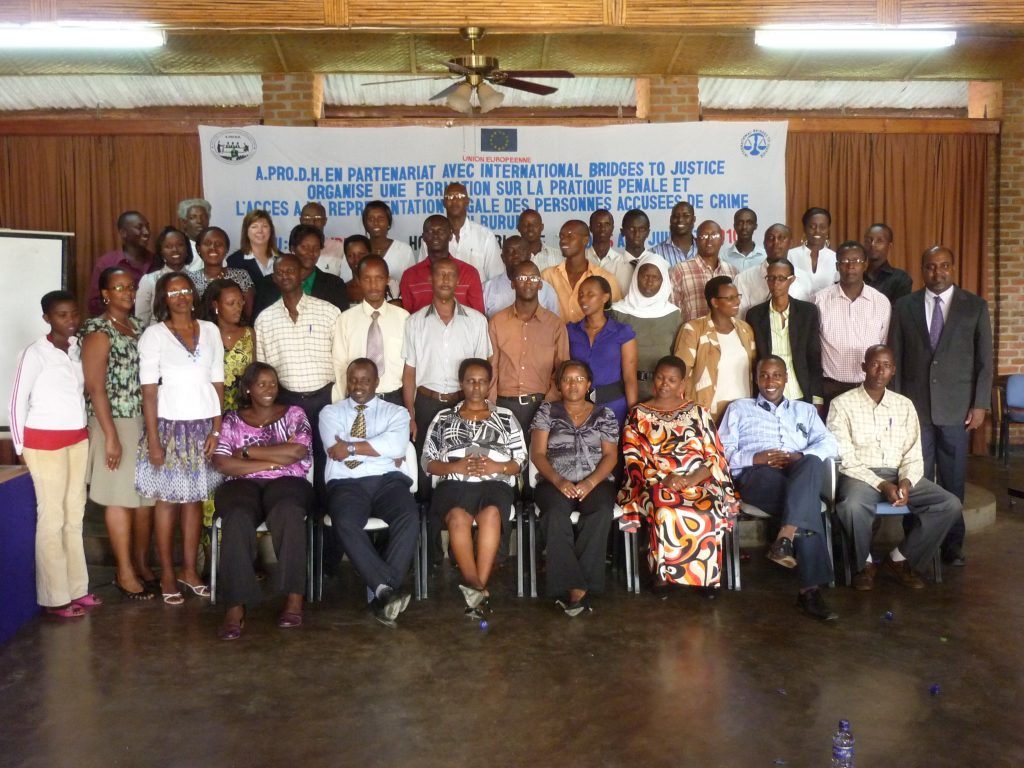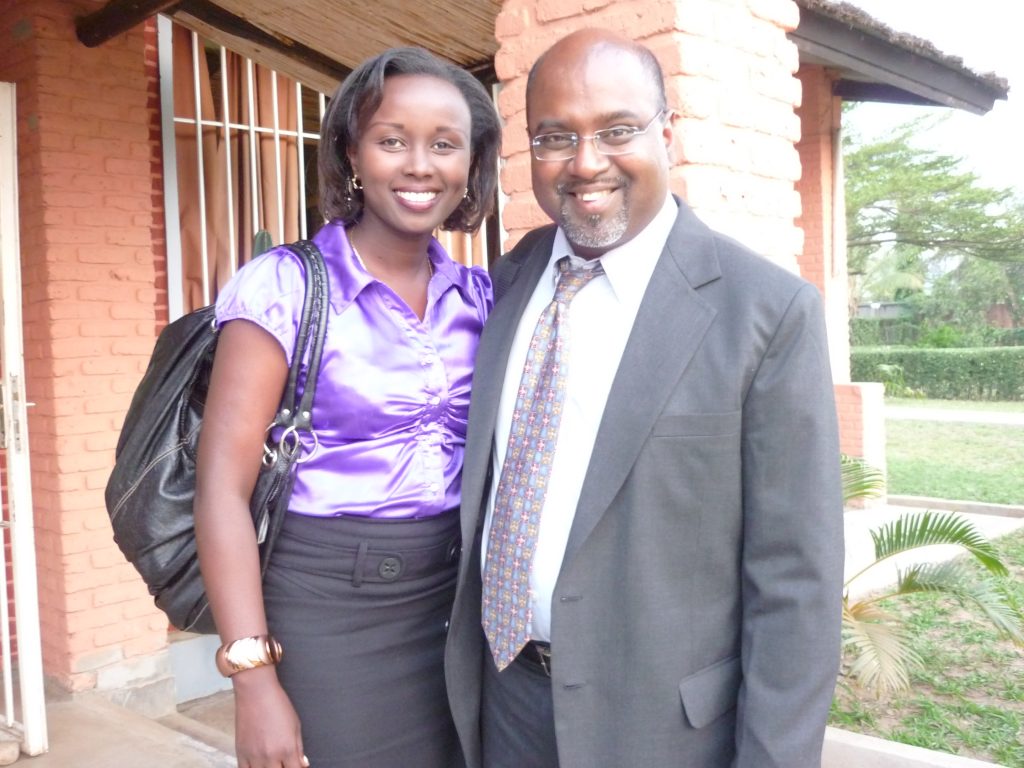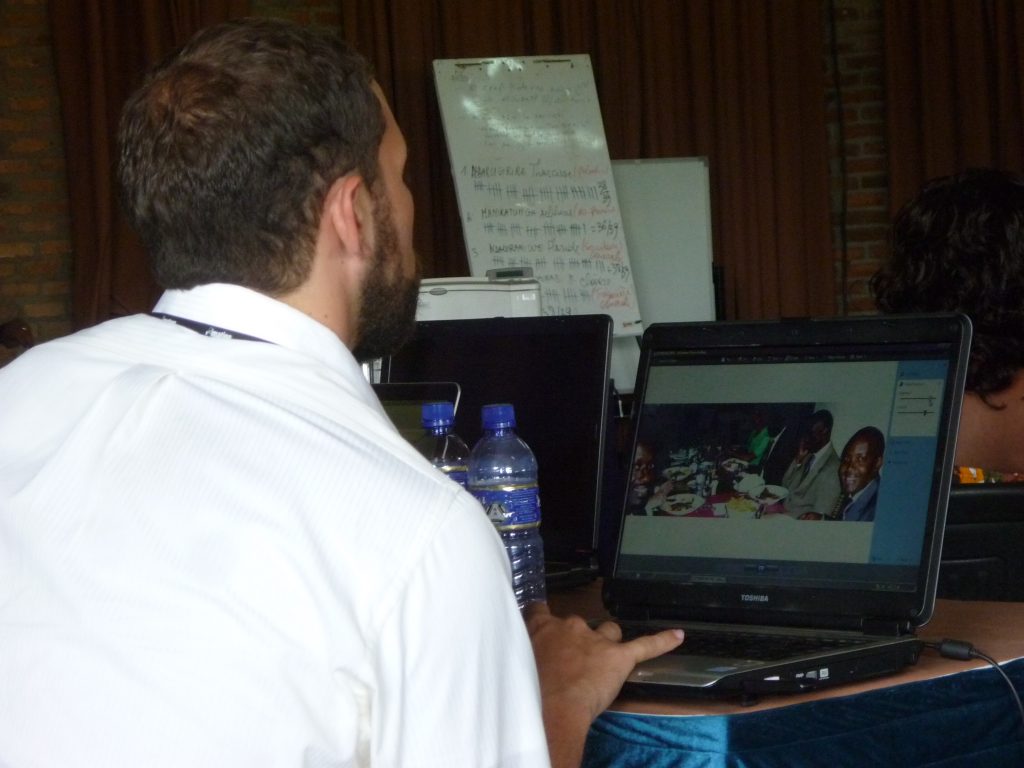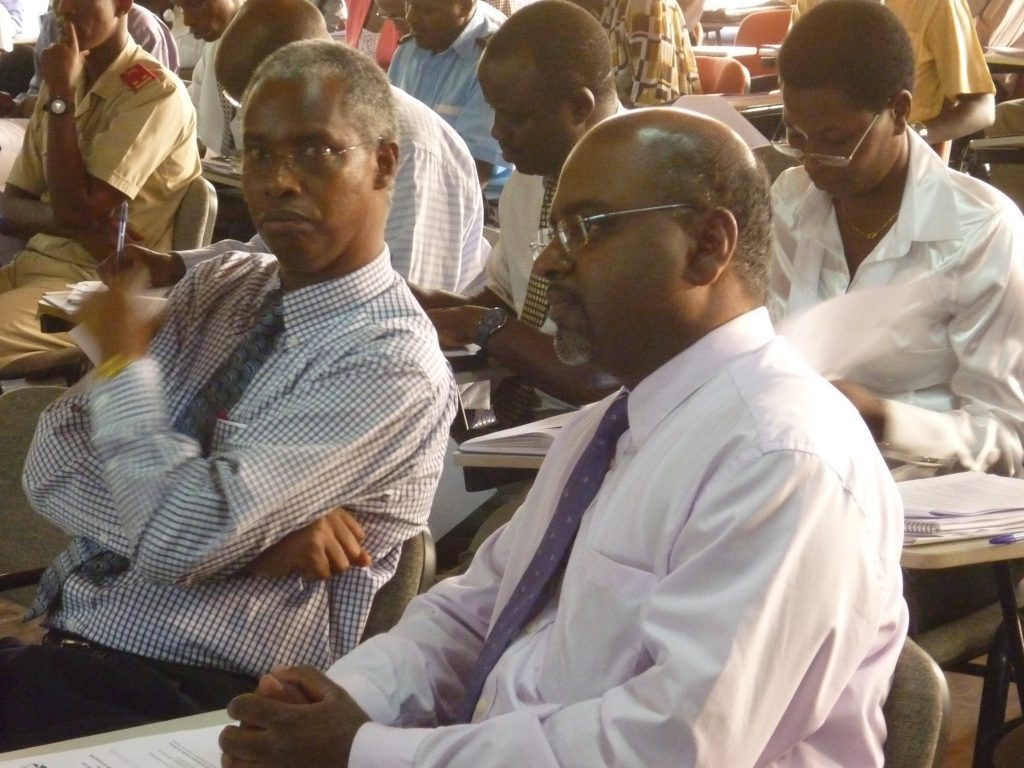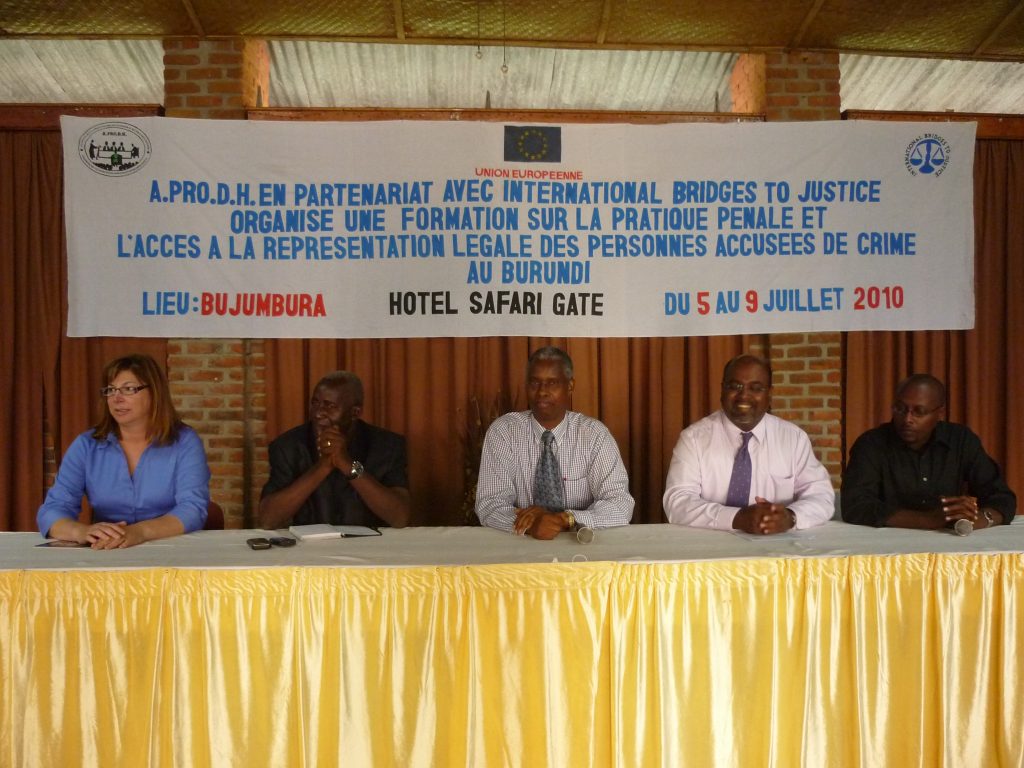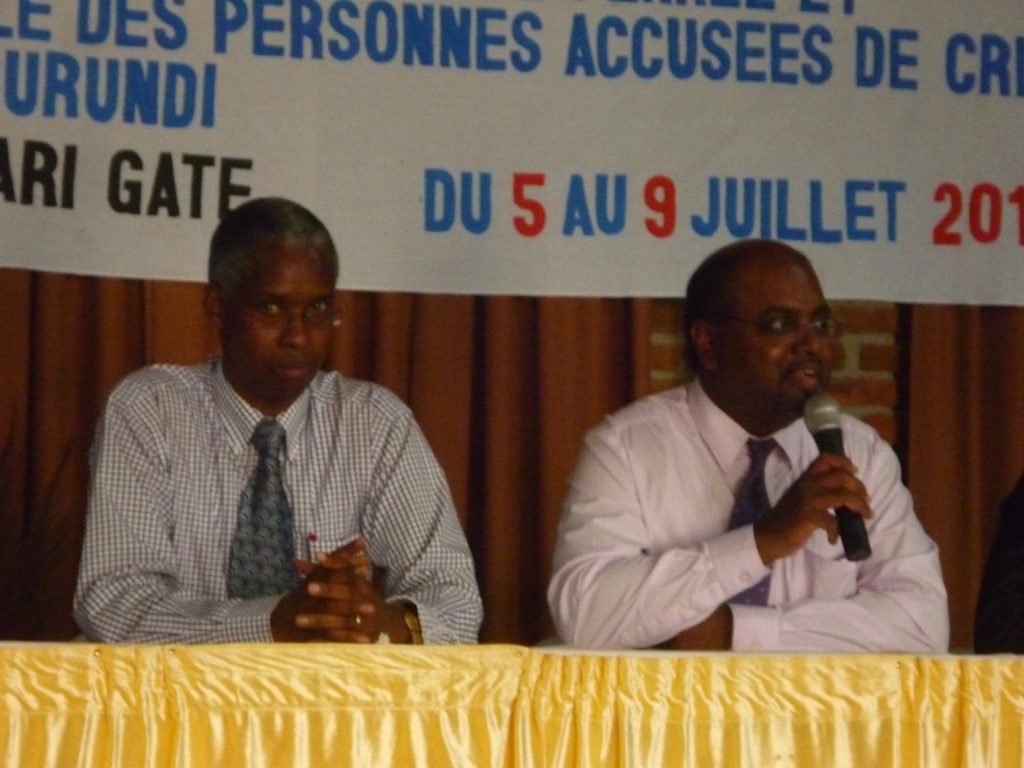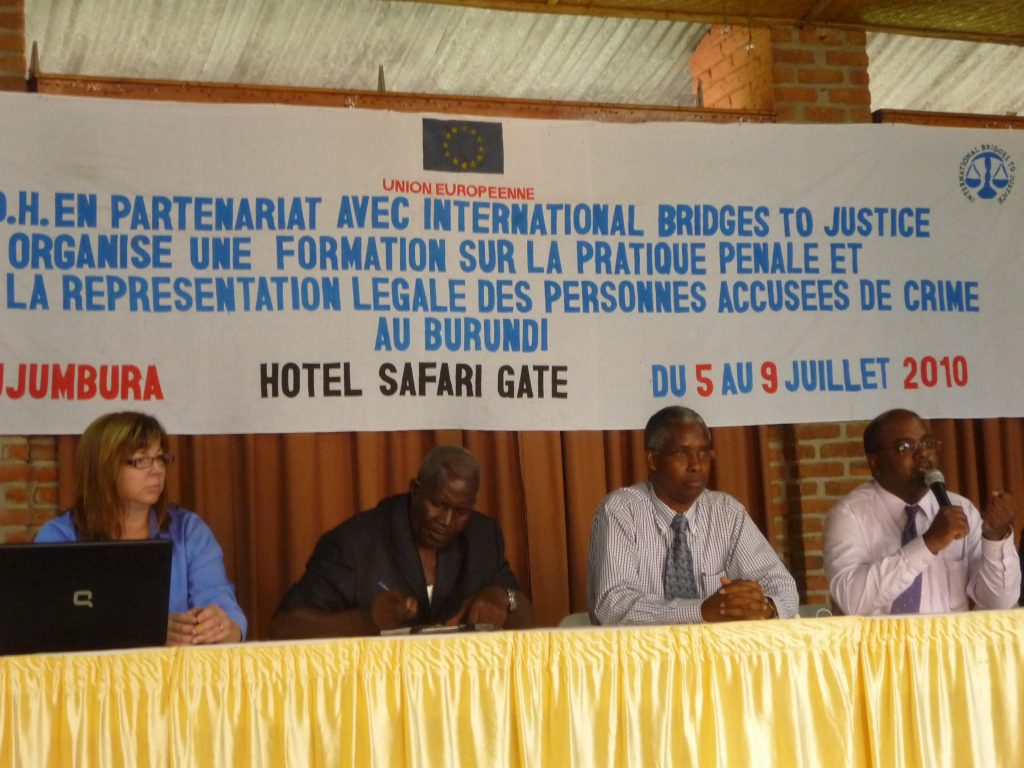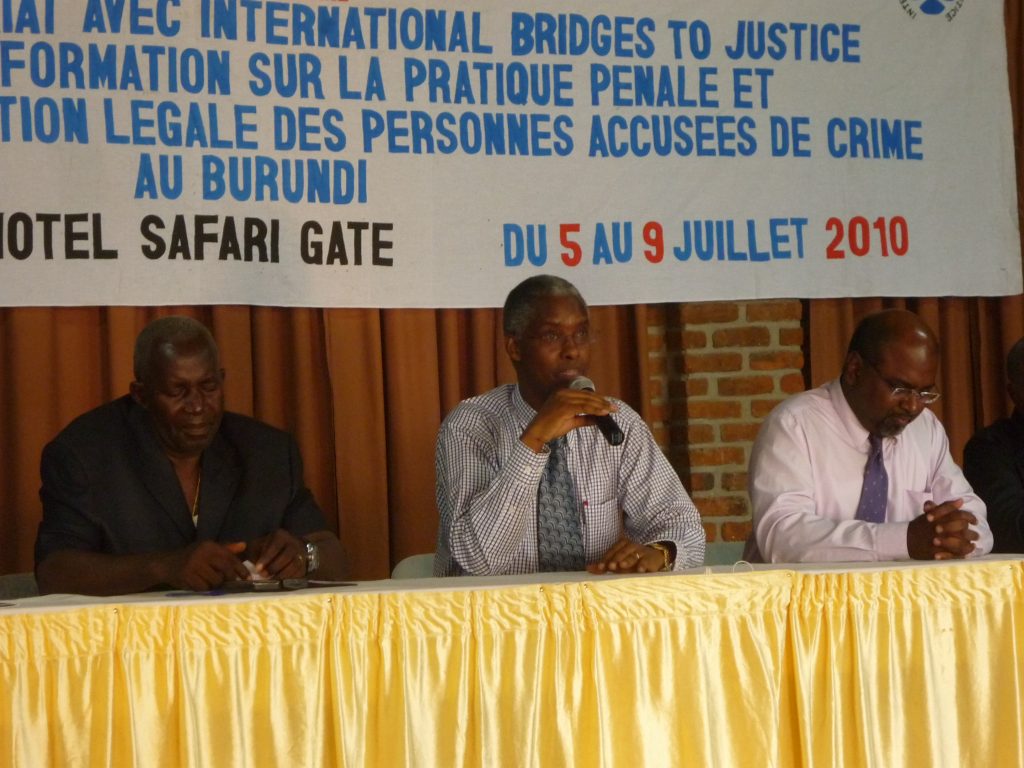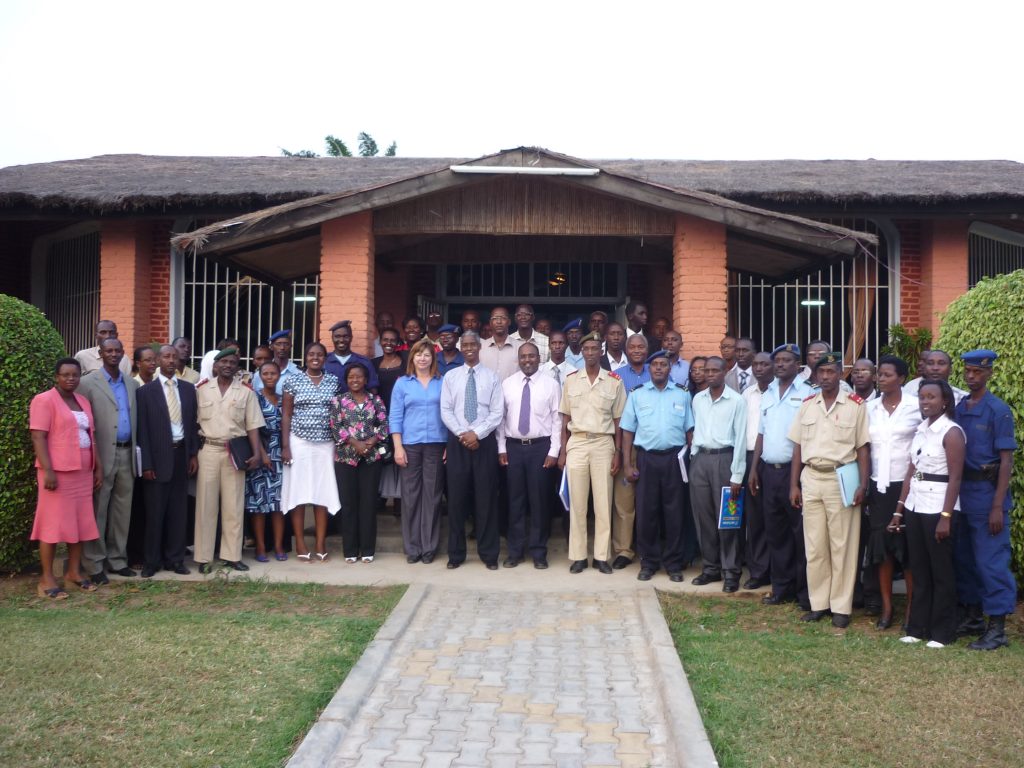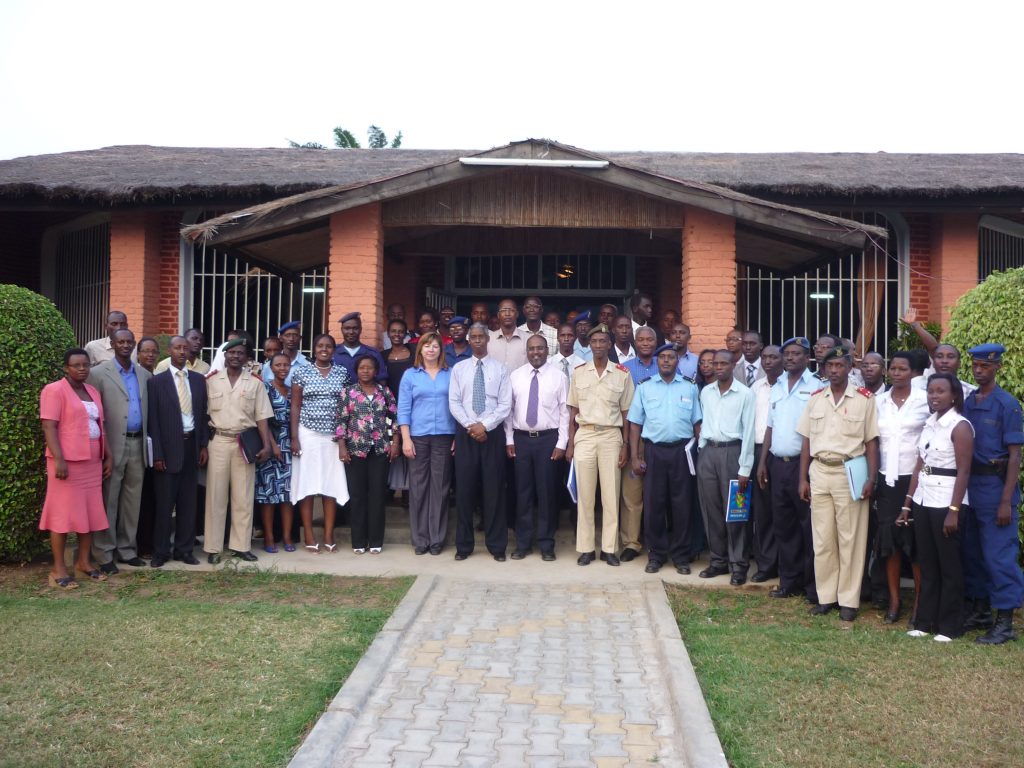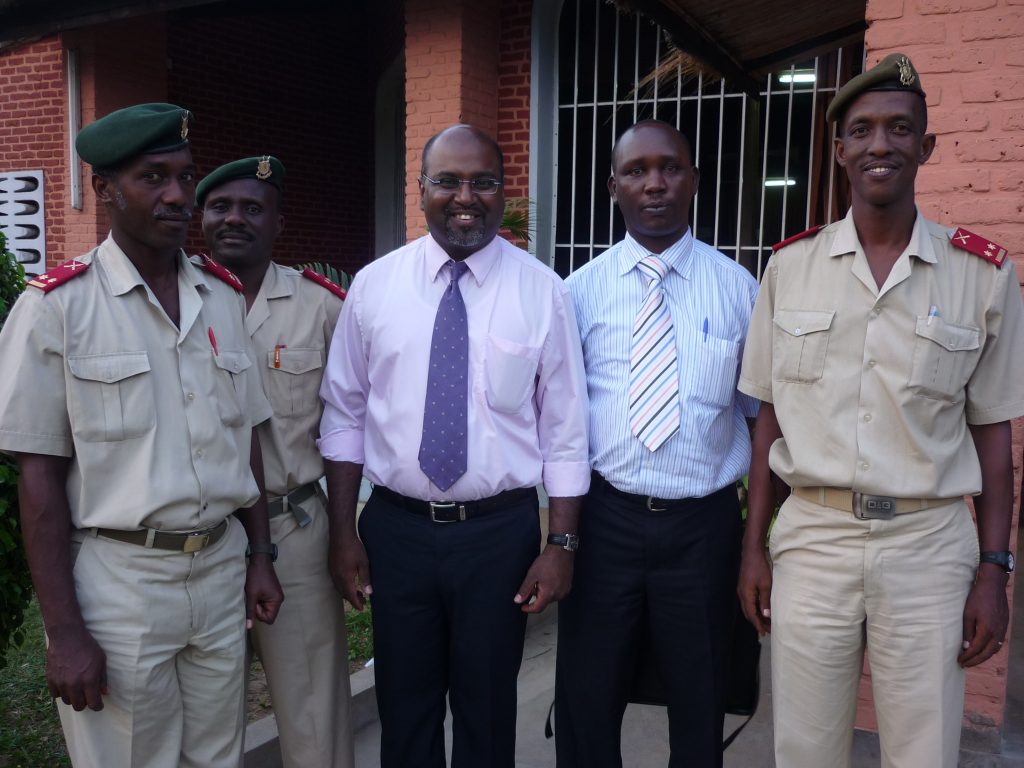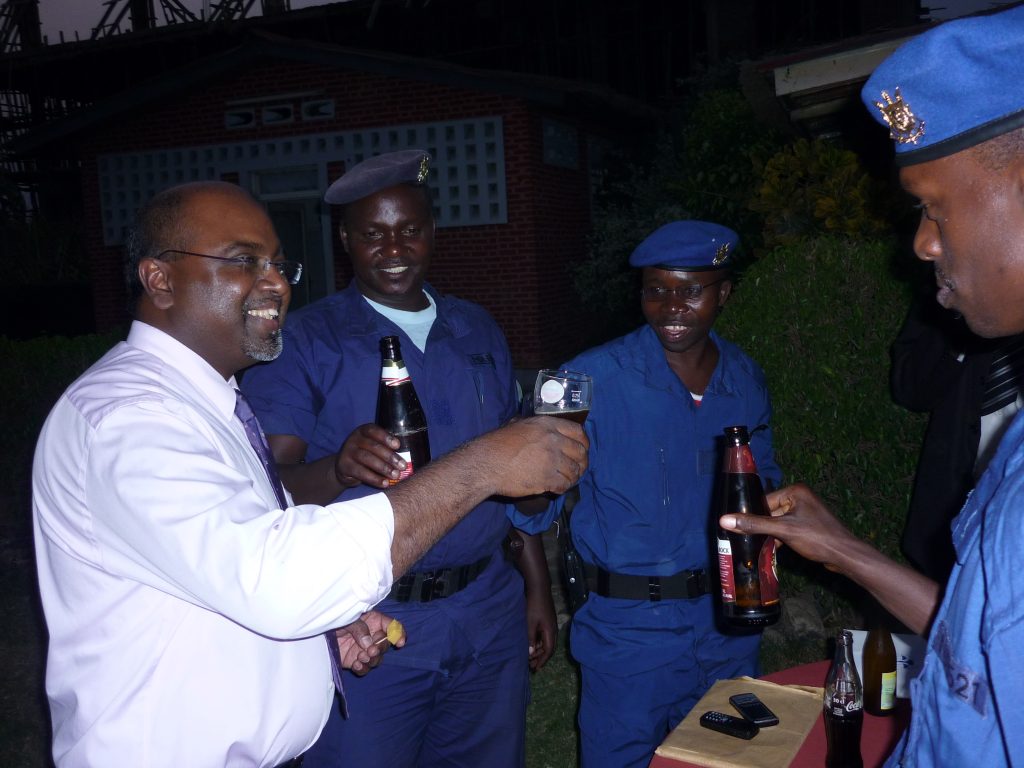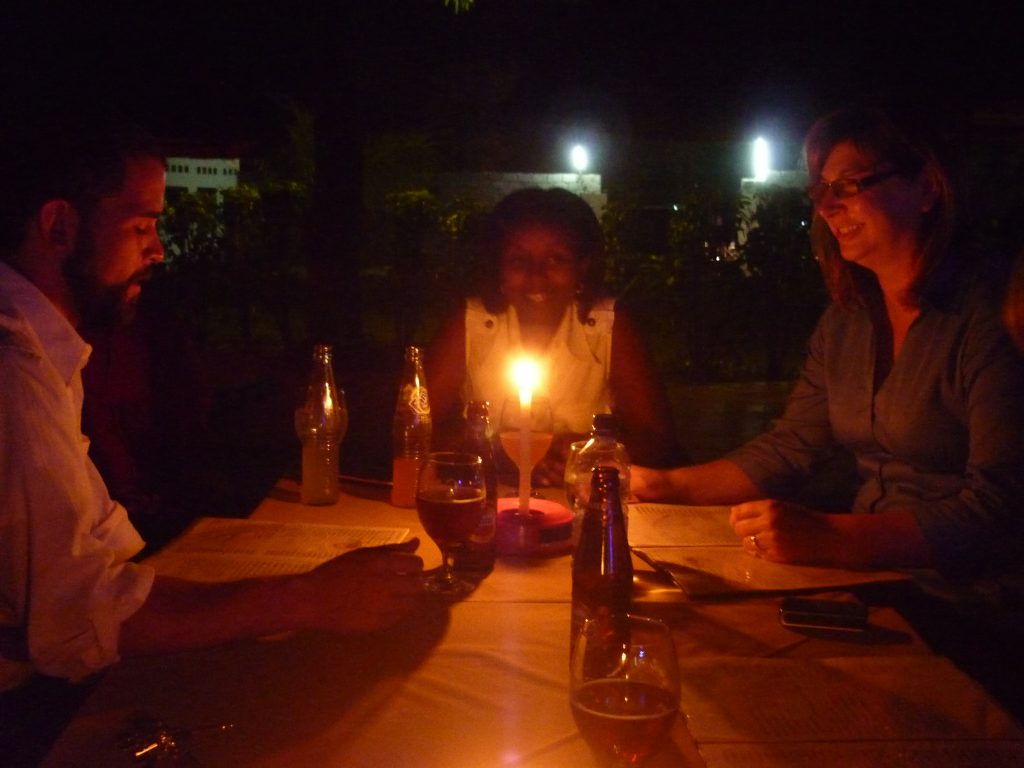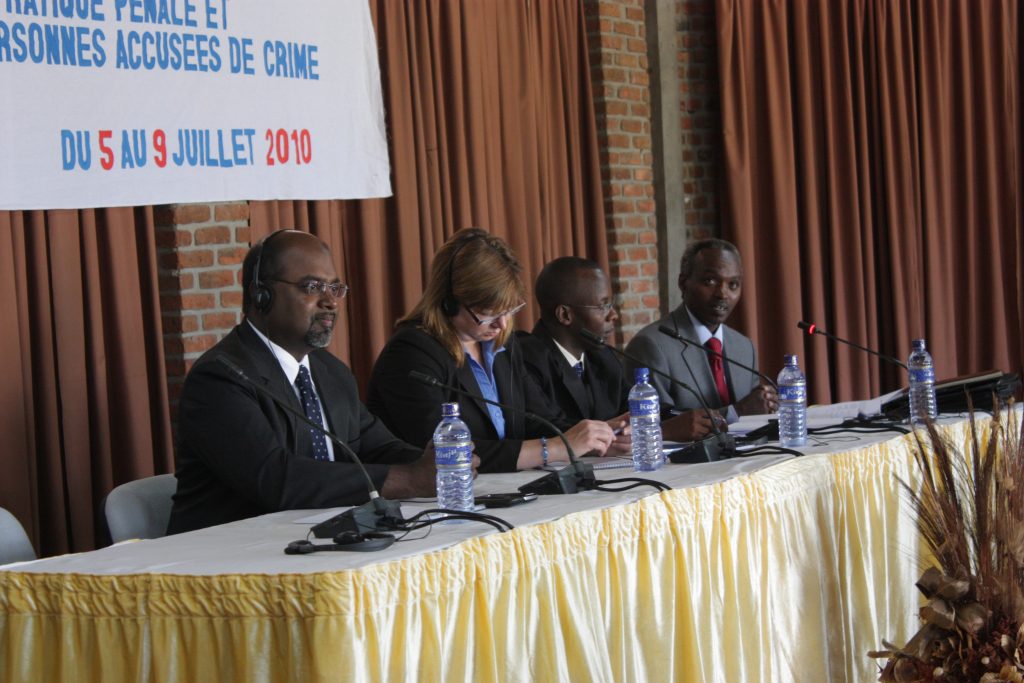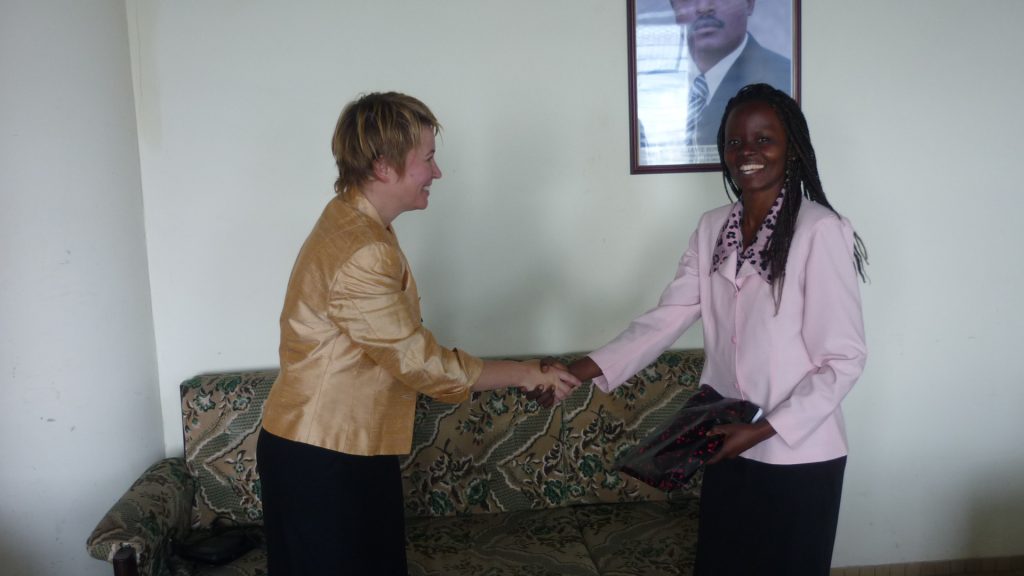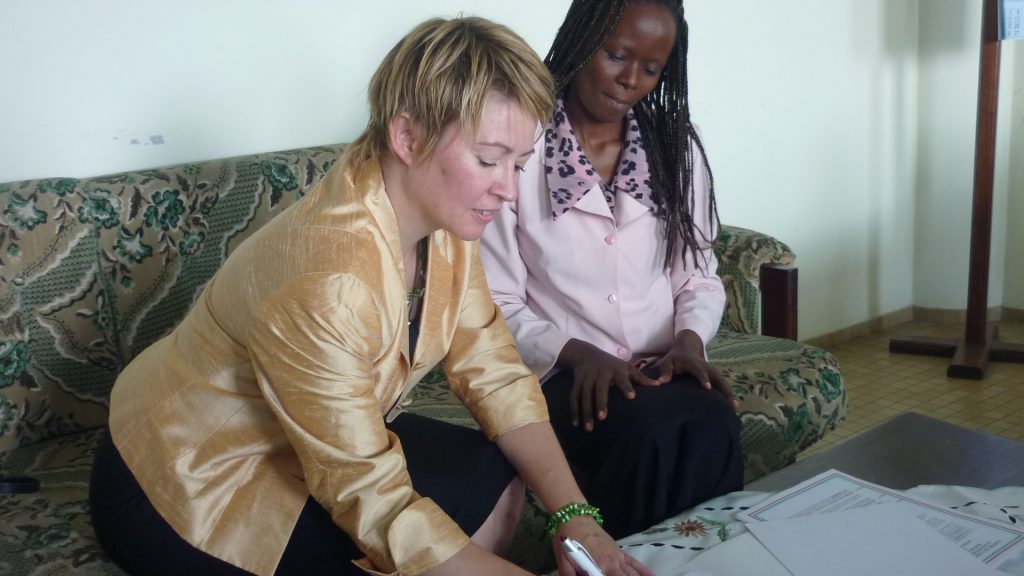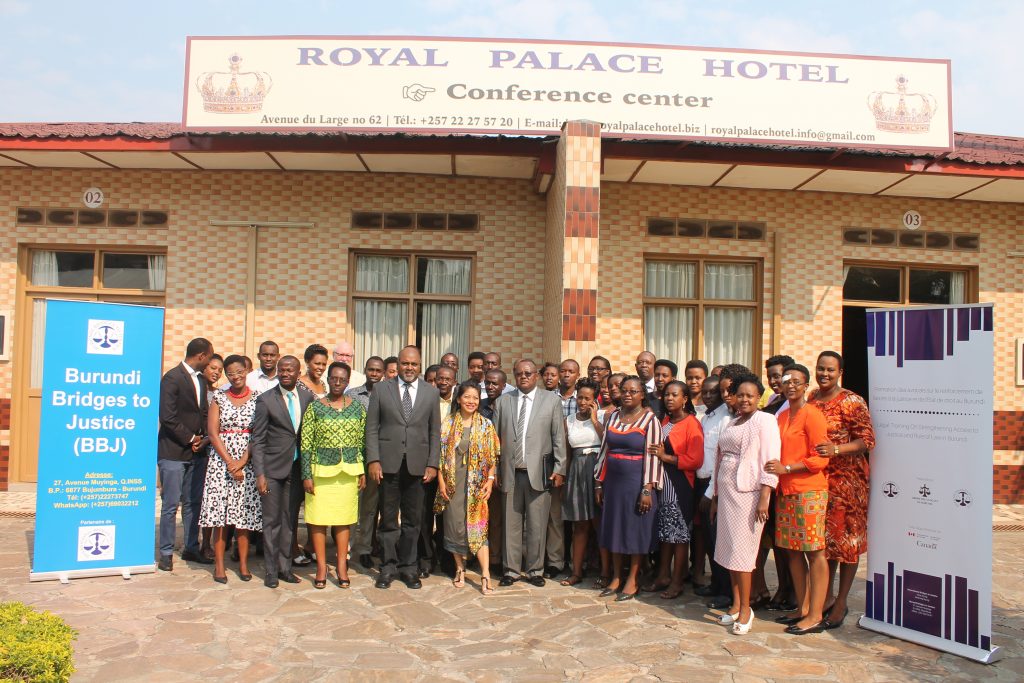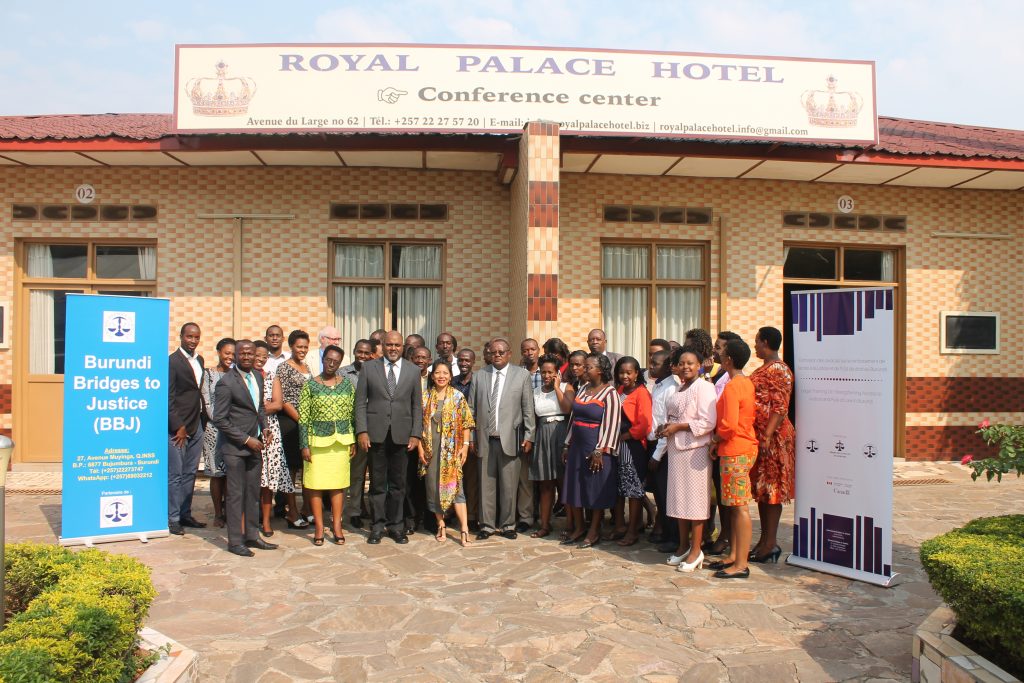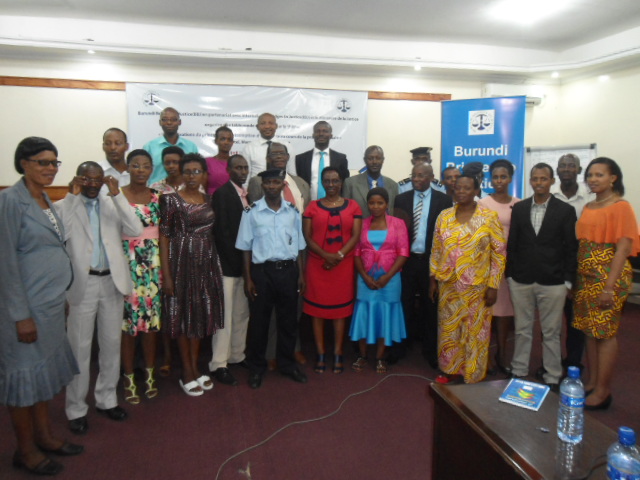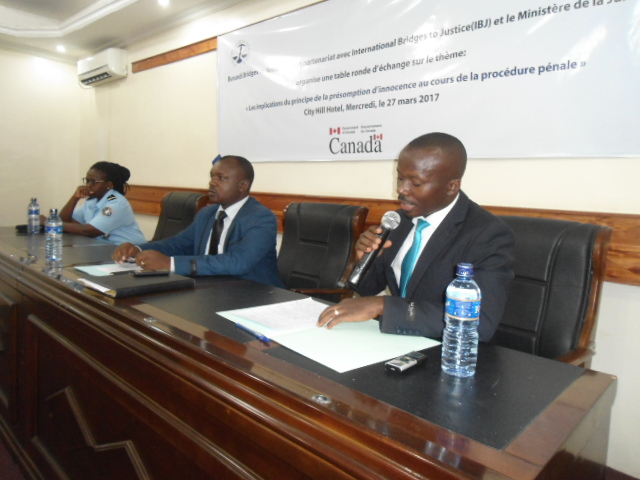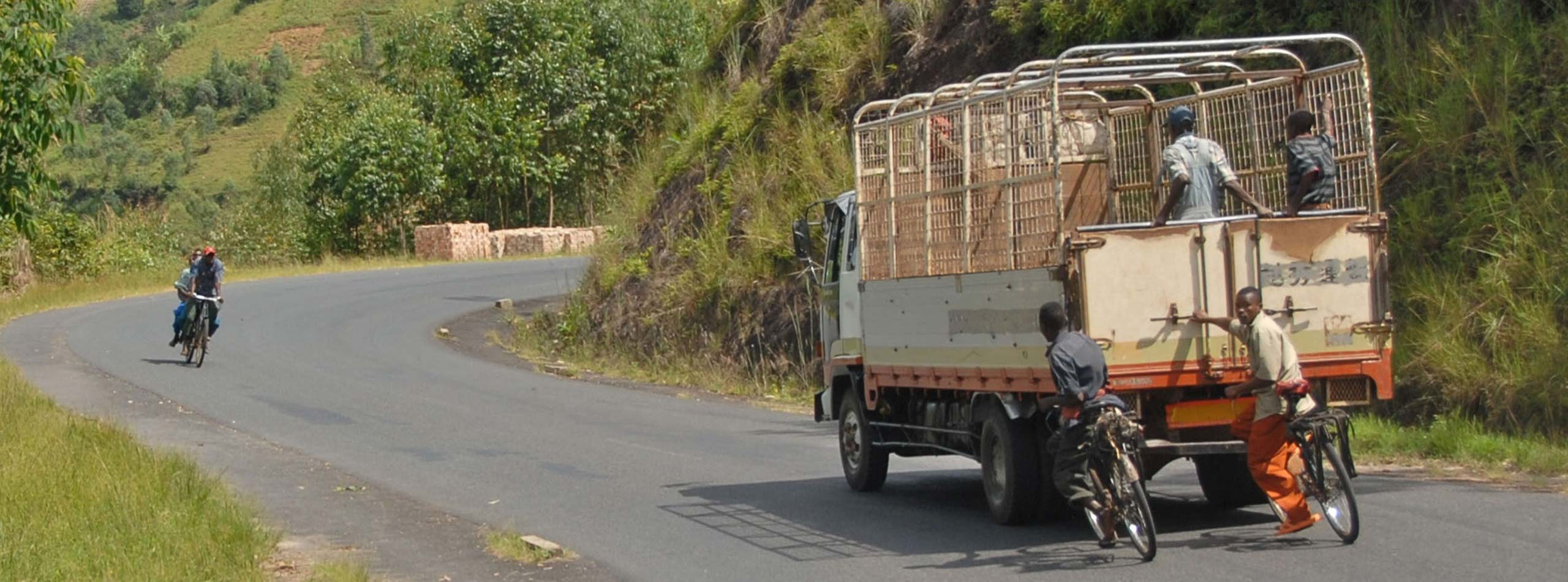IBJ established its first Defender Resource Center in Burundi in Bujumbura in 2008. Since then, Burundi Bridges to Justice has worked to strengthen the legal system in Burundi and carried out numerous activities, such as building a group of “Women Lawyers Team” to offer pro-bono legal defense to female detainees by female lawyers, conducting training for prison officials, police, and judges, organizing roundtables in order to promote best practices and legal reform, and providing training for defense lawyers.
Country Background:
When IBJ first came to Burundi in 2006, torture was widespread and regular at police stations and Judicial Police Officers had a stick in their offices. Torture was not a crime. There were only 96 lawyers in the entire country. Prisons were overcrowded and often children were imprisoned with adults. They were walking holding hands in groups to protect themselves from potential abuse. The law was not taking into consideration the special condition of children. Thousands of detainees, including women and children, had no legal representation. And there was no form of legal aid. When we talked to the president of the Bar Association lawyers providing legal representation to the indigent accused pro bono, he was adamantly opposed to it and said, “we are a poor country, and our lawyers do not work pro bono.” Legal assistance was given to a privileged few.
Success Stories:
Three Vulnerable Boys Regain their Freedom
Lévis, Bienvenu, and Rukundo, teenagers from Kayanza, traveled over 200 miles to work in Bujumbura, seeking to support their families back home. At just 16 and 18 years old, they found work at Cotebu Market, helping customers carry their goods to cars and buses. The boys spent most of their days waiting at the market entrance, hoping for a few calls from people needing an extra pair of hands.
Click here to read the rest of the story
But on January 17, 2024, their lives took an unexpected turn. As they were chatting at the market’s entrance, they noticed a man approaching his car in distress, claiming that he’d been robbed of 900,000 Burundian Francs (BIF) left inside. Amid the crowded market, security guards quickly turned their suspicions on the boys, accusing them of the theft. Despite the boys’ firm denials, they were handed over to the municipal police, thrust into a grim and unfamiliar world.
By sheer luck, lawyers from Burundi Bridges to Justice (BBJ) happened to be at the police station that day, assessing cases as part of their mission to protect the vulnerable. They learned about the three boys’ plight and decided to take on the case, driven by a deep sense of injustice. Arguing before the judicial police, the lawyers emphasized that the accusations were based on mere assumptions. Being close to a car did not make them thieves, the lawyers argued. There was no evidence, no witnesses, and nothing tying the boys to the alleged theft.
The lawyers’ advocacy extended beyond legal arguments. They painted a picture of the boys’ lives, describing how their meager earnings were crucial to their families in Kayanza. These were not young criminals but hardworking boys with a sense of responsibility far beyond their years. The BBJ team insisted that, without any proof, holding them in custody was both unjust and inhumane.
Their defense struck a chord, and the judicial police officer ultimately agreed that there was insufficient evidence to justify holding the boys. The case continued with an investigation to identify the real perpetrator, but the boys were released, allowed to return to their work and their mission to support their families.
For Lévis, Bienvenu, and Rukundo, the experience was a harrowing brush with a system that so easily could have derailed their young lives. Thanks to BBJ’s intervention, they walked away with their dignity intact, a second chance to keep their lives—and dreams—moving forward. Their case stands as a reminder of the power of legal advocacy to protect the innocent and ensure justice for the underserved.
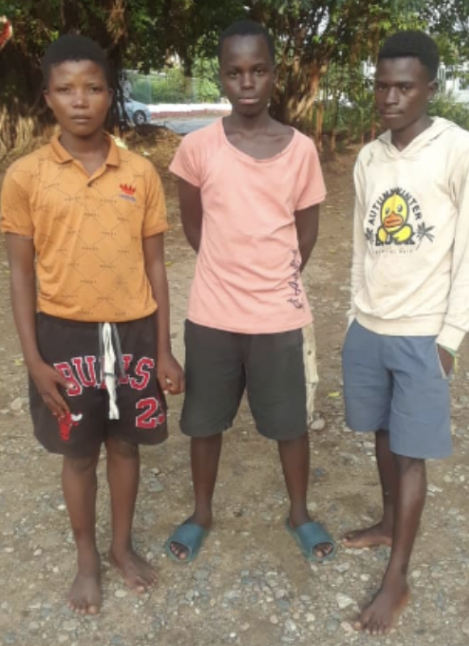
Years in Prison for No Crime
Loana Haramahoro (name changed) was 18 years old when she was arrested in 2021, her formal arrest following a brief informal arrest by the National Intelligence Service (NIS). The NIS were pursuing her because she had information about a Mr ANTON (name changed) and a man who was highly wanted by the NIS. Mr Anton was accused of supplying arms to Burundian rebel groups based in the Democratic Republic of Congo. As ANTON was a wanted man and it was discovered that Loana was a close friend of ANTON, Loana was captured by the NIS to facilitate the arrest of Mr ANTON.
Click here to read the rest of the story
When Loana was informally arrested, she was in her home province. The head of the National Intelligence Service in her province was responsible for her arrest. She was detained in the NIS prison in Bujumbura and threatened with death until she agreed to go with them to the place where Anton was supposed to be. They travelled in an NIS vehicle and forced Loana to call Mr ANTON so that they could meet. She had no choice. When they arrived where ANTON lived, Loana refused to show them the exact place where ANTON was, but the NIS agents contacted the District Chief, who eventually showed them Mr ANTON, and then ANTON was taken into custody to the NIS dungeons.
Loana was released and Mr ANTON was arrested. But unfortunately, instead of investigating his case, ANTON became a victim of enforced disappearance. Neither his family nor Loana received any information about what had happened to Mr ANTON. When ANTON’s family searched in vain for their son, they decided to file a complaint against Loana, who was arrested by the judicial police. Her case was referred to the public prosecutor, who accused Mrs Loana of kidnapping Mr ANTON. An arrest warrant was issued and she spent more than a year without appearing in court.
One of BBJ’s lawyers was then informed of Mrs Laona’s case. He met her when she was torn apart by fear and hopelessness. He decided to provide her with legal representation. He followed her case and secured an opportunity for her case to be scheduled for trial. It took another two years for the court to rule on Loana’s case. Although the case was heard for the first time, the judge found it necessary to summon Anton’s mother and the prosecutor’s witnesses, and the case was sent back to court to hear the prosecutor’s and Anton’s mother’s witnesses. After several absences of these witnesses, the BBJ lawyers asked the court to grant Mrs Loana access to justice and to consider her constitutional right to be tried within a reasonable time. Finally, in October 2023, after a long legal battle, BBJ’s lawyer succeeded in having Mrs Loana acquitted by a court decision declaring her innocent.
It took another four months to get her out of prison, as it was only on 28 February 2024 that Mrs Loana was granted permission by the prosecutor to return home.
While Laona’s case involved aspects of the enforced disappearance of an individual, a big question was: “who was responsible? Was it Loana? Or the NIS agents? Loana was able to provide evidence that she had been arrested by the NIS just before Mr ANTON disappeared. Even Anton’s mother had told the judicial police that she knew that her son was wanted by the state security services. All this became an element supporting the fact that Loana was not guilty of kidnapping Mr ANTHON. They were a basis for the BBJ lawyer who helped Mrs Loana to prove that she could not be responsible for the kidnapping of his good friend.
But if Loana had not been properly defended by a competent lawyer, it would have been so hard for her to convince the judge otherwise, while the prosecutor was vehemently calling for 20 years imprisonment. Loana would have been sentenced to 20 years imprisonment simply because she was a friend of Mr ANTON and was forced to show the NIS where he should be. “When I saw Mrs Loana for the first time, her eyes were filled with tears of pain, but when I saw her leaving the prison gates, her eyes were filled with tears of joy,” said the BBJ lawyer who represented Mrs Loana. Loana’s case is yet another example of how BBJ’s legal representation is a powerful tool to bring hope to the hopeless and to protect the rights of ordinary citizens, including vulnerable women.
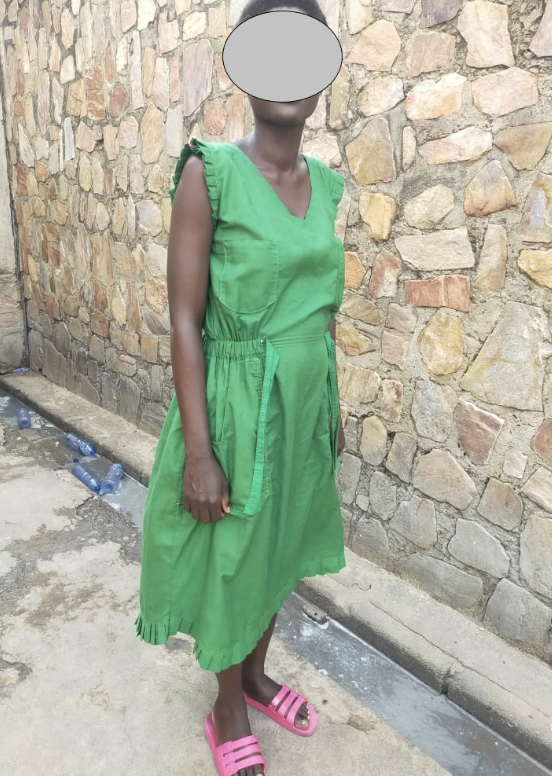
A Young Boy’s Access to Justice
Eighteen-year-old Régis had left his home in Gitega with a mission in mind: to find work in Bujumbura and send money back to support his younger siblings and struggling parents. In the bustling Buyenzi area, he found a job at a local restaurant, finally able to bring hope to his family with his earnings. But fate had other plans.
Click here to read the rest of the story
On the morning of February 25, 2024, Régis found himself caught up in a storm he hadn’t anticipated. His friend and coworker, Clovis, had hatched a plan to steal two cans of palm oil from the restaurant owner. Régis, a young man with a good heart, tried to talk him out of it, urging Clovis to reconsider. But Clovis wouldn’t relent, and, against his better judgment, Régis agreed to help Clovis find a buyer. The buyer, however, couldn’t pay upfront, leaving both boys in a bind. After waiting days for payment that never came, Clovis decided to return the stolen cans. Régis complied, hoping to put the entire ordeal behind him.
But things took a sharp turn. When the buyer returned the cans directly to the restaurant owner, Régis was identified as the one in possession of the stolen goods. Although he admitted to his role without hesitation, his heart sank as he was taken into custody at the local jail, facing the weight of his poor decision. He knew he had made a mistake, and he cooperated fully with the police investigation, sharing all he knew to clear the air.
The legal proceedings took a more compassionate turn when BBJ, a lawyer advocating for the young man, requested leniency. Seeing the regret in Régis’s eyes, the lawyer appealed to the restaurant owner to forgive this boy, who had been swept up in his friend’s mischief without malicious intent. Touched by Régis’s sincerity and the lawyer’s plea, the restaurant owner agreed. Ultimately, a fine was imposed, but recognizing the financial strain on both boys, BBJ successfully negotiated for their release without payment.
Thanks to the lawyer’s persistence and the restaurant owner’s forgiveness, Régis walked out a free man. The lesson was harsh, but he returned to his family with a stronger resolve, determined never to stray from the values that had guided him there in the first place.
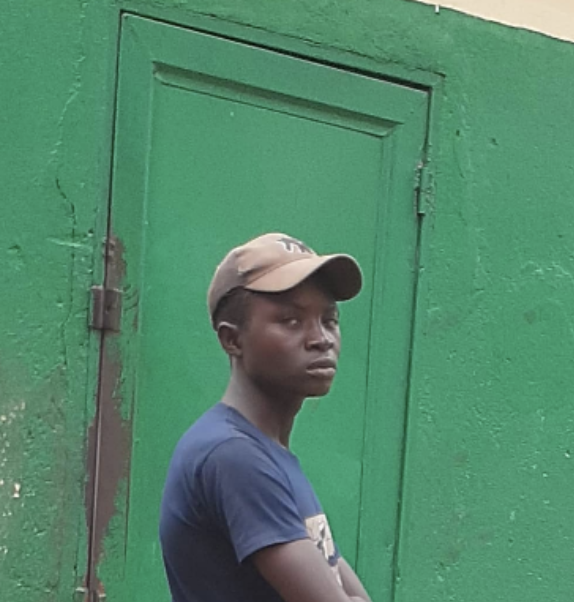
Mother of Three Children gets Acquitted and Recovers her Freedom
Esperance Irankunda, a 34-year-old mother of three, had always been the backbone of her family. She worked tirelessly as a local grocer, supporting her children as her husband, gripped by drug addiction, neglected his role in the family. But on March 7, 2024, Esperance’s world took a dark turn.
Click here to read the rest of the story
Her husband, demanding control of the family’s hard-earned possessions, became violent when she refused. He lashed out, and, joined by his friends, Esperance was beaten and then forced to go to the Bwiza police station, where the situation took an even graver twist.
In a harsh irony, Esperance was arrested and charged with assaulting her husband, a painful misinterpretation of events that added injustice to her trauma. As fate would have it, a team from Burundi Bridges to Justice (BBJ) was at the police station on International Women’s Day. Hearing her story, they stepped in immediately, recognizing her as a victim, not an offender.
The BBJ women’s team pleaded her case to the judicial police officer, explaining that Esperance was a survivor of domestic violence, not an aggressor. She needed support, not punishment. Moved by their argument, the officer dropped the charges and arranged for her to be taken to the Seruka Centre, a specialized facility where survivors of sexual and domestic violence could receive care and counseling. Her husband, meanwhile, was taken into custody, finally held accountable for his actions.
After treatment and counseling at Seruka, Esperance returned home, and the joy was clear in her children’s faces as they welcomed their mother back. The ordeal had been a test of her resilience, but with BBJ’s help, Esperance had won her freedom and a fresh start, proof of how justice can protect and uplift women, especially those who bear the weight of responsibility alone.
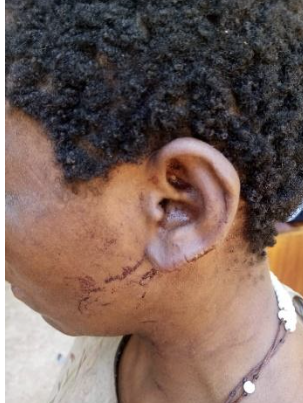
Mother of Two Children Unjustly Accused of Robbery
“Alima,” a 26-year-old mother of two children, was unjustly arrested by the police in Bujumbura, accused of being an accomplice to a robbery. In reality, Alima was only a witness to the robbery on her neighbor’s land.
Click here to read the rest of the story
Despite her innocence, she was apprehended by the police along with the other suspects. A BBJ lawyer intervened on her behalf, asserting that there was no evidence implicating Alima in the crime and therefore she should not bear any criminal responsibility. Due to this legal representation, Alima was able to regain her freedom. This case underscores the importance of legal advocacy in protecting the rights of individuals and ensuring justice in the legal system.
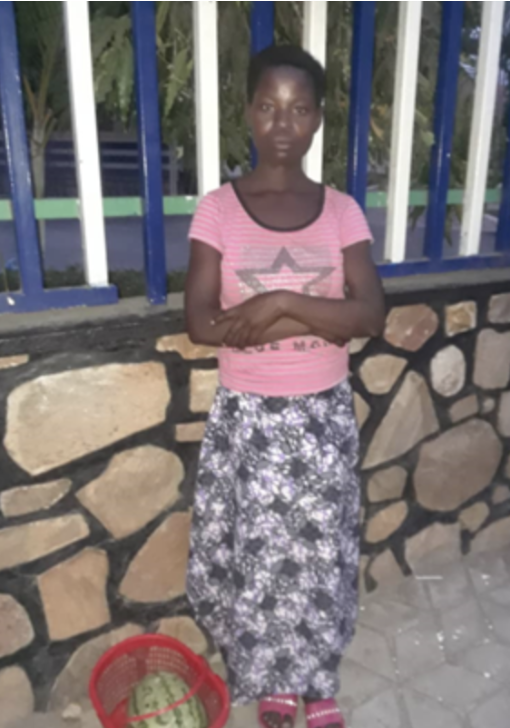
Teen faces Two-Year Prison Term over 12 Dollars
“Taner”, a 16-year-old boy, faces a potential two-year prison sentence on charges of ‘Undermining the national economy’ over a transaction involving just over 12 US dollars.
Click here to read the rest of the story
His ordeal began on June 15, 2023, when he was arrested around 10 p.m. for accepting old banknotes, now invalid, while selling coal. Authorities swiftly apprehended both the customer and Taner upon closer examination of the banknotes. Facing serious charges, Taner sought legal assistance from Mrs. Fides Nibasumba, a collaborating lawyer with BBJ. She argued that Taner’s acceptance of the counterfeit notes was not indicative of criminal intent, referencing articles 18, 19, and 20 of the penal code. The judges resonated with her arguments, resulting in Taner’s provisional release, along with the customer.
Arrested Without Evidence
In Bujumbura, “Jean” was wrongly arrested by the police on suspicion of robbing a local bar.
Click here to read the rest of the story
BBJ lawyer Mr. Révérien intervened, demonstrating that Jean was arbitrarily arrested without evidence. Mr. Révérien’s efforts revealed that the police had violated the law by arresting and detaining Jean unjustly. Consequently, Jean’s conviction was overturned, and he was released from custody.
Impact in Numbers:
When IBJ first came to Burundi in 2008, there were only 70 lawyers working in the entire country, and there was no form of legal aid for its approximately 9 million people. A decade after IBJ started working in Burundi, the number of lawyers adhering to the Bujumbura Bar Association multiplied by ten. Similarly, when IBJ began its program in Burundi in 2008, the rate of pre-trial detention was between 62% and 66%, which has now risen to around 40%.
- 10k+ people provided with legal representation
- 500+ lawyers trained
- 500+ justice officials trained through roundtables
- 7,4m+ people reached through rights awareness campaigns
- 1 Defender Resource Centre (DRC)
- 7 eLearning Modules created
Map:
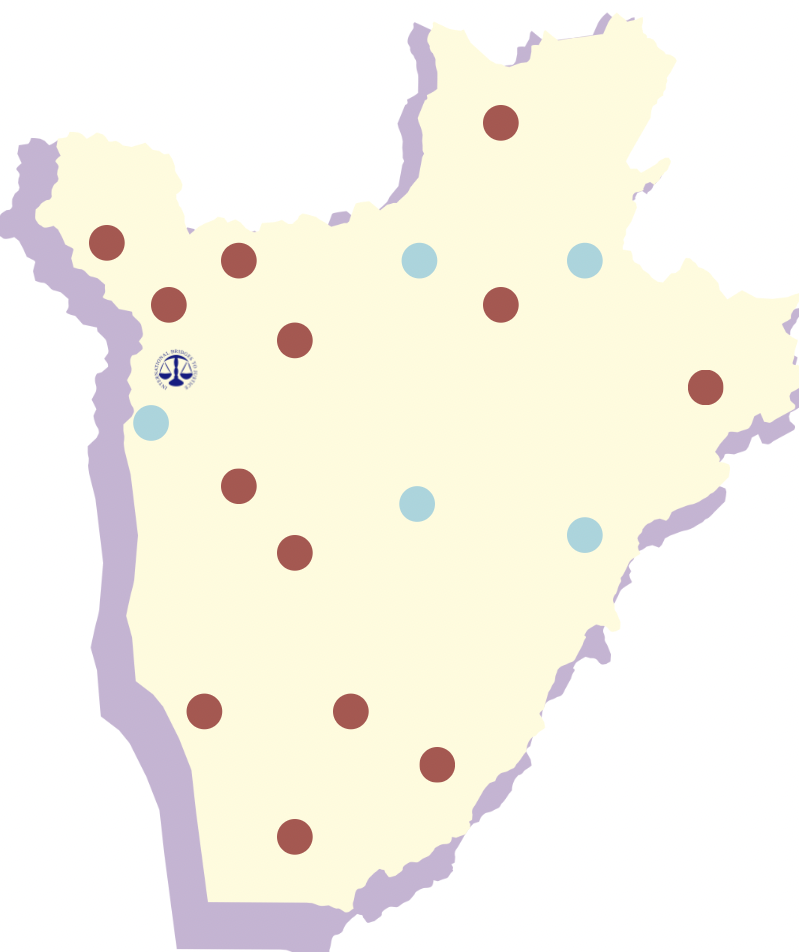
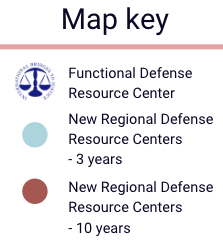
Defender resources:
In Burundi, IBJ provides training, tools, manuals and eLearning modules, developed with our partners, funded through grants, and resourced through pro-bono assistance.
- DefenseWiki in French, English and Spanish– references, legal codes, and assessments
- Defender Manual – Criminal Defender ToolKit – French
- Defender Manual – Pre-trial detention ToolKit – French
- eLearning Modules – in-depth and topic-focsed training (login required).
Timeline :
2006 – IBJ signs MOU with the Burundi Bar Association
At the beginning of November 2006, Karen Tse, founder and director of International Bridges to Justice, signed a Memorandum of Understanding with the Burundi Bar Association. This marked the beginning of a long cooperation between these two bodies, as well as a relentless commitment on the ground to protect the prisoners.
2008 – The establishment of the first Defender Resource Center in Bujumbra marks the launching of Burundi Bridges to Justice (BBJ)
BBJ organizes the first criminal defense skills training.
In May 2008, a group of lawyers, judges, prosecutors and judicial police officers was convened on protecting rights of the accused and preventing investigative torture. These training contributed to improve skills and commitment among Burundian lawyers that also started performing pro bono legal representation, which was a new concept.
BBJ conducts a number of Roundtable events.
For the first time, judges, prosecutors, police and lawyers were brought together to discuss rights violations within the criminal justice system. Important principles were discussed such as the Presumption of Innocence, the special needs for children or the need to criminalize torture. Today, the Burundi’s Ministry of Justice approves IBJ’s model at roundtables and sends representatives as a matter of procedure to the events.
2009 – Burundi’s criminal code abolishes death penalty and criminalizes torture and atrocity crimes
2010 – IBJ closes the gap to legal assistance and trains ⅔ of lawyers in Burundi.
When IBJ first came to Burundi in 2008, there were only 70 lawyers working in the entire country, and there was no form of legal aid for its approximately 9 million people. Since its founding 2006, IBJ has by now trained 2/3 of lawyers in the entire country.
2011 – BBJ and other organizations launch an advocacy campaign on juvenile justice.
The long-term campaign, aiming to transform the system through addressing key issues, resulted in the adoption of a new criminal procedure code with a key change by enacting a different set of rules for juveniles within the criminal justice system.
2012 – BBJ has Memorandums of Understanding with key stakeholders and develops strategic partnerships with organizations.
BBJ has Memorandum of Understanding with the General Inspectorate of Burundi National Police, the Ministry of Justice and Civic protection, and the Burundi Bar Association. It also developed strategic partnerships with, the Governmental Action Observatory (AOG), the African Union Human Rights Observers Mission, the National Independent Commission for Human Rights (CNIDH), the Association of Catholic Jurists of Burundi (AJCB), and the Trauma Healing and Reconciliation Services (THARS).
2013 – Over 1,200 vulnerable individuals are released from prison after the incorporation of the principle of “Freedom is the Rule, Detention is Exception”into the Criminal Procedure Code
2015 – A coup attempt in Burundi reinforces the political unrest of the country
In 2015, Burundi plunged into a political and human rights crisis after President Pierre Nkurunziza sought a third term, sparking protests met with excessive force from the police. A failed coup attempt in May intensified government repression, forcing many human rights NGOs into exile. Since then, Burundi has faced a political and economic crisis, undoing democratic advancements made after the conclusion of a 12-year civil war in 2005. The nation has experienced a shift towards authoritarian rule, characterized by the violent repression of perceived opponents of the ruling party, the National Council for the Defense of Democracy–Forces for the Defense of Democracy (CNDD-FDD).
BBJ is registered as a legal entity
While being registered as a legal entity, BBJ remains one of the country’s few human rights-related NGOs permitted to work.
2017 – Burundi becomes the first country to withdraw from the International Criminal Court
In October, Burundi made history by becoming the first country to withdraw from the International Criminal Court (ICC), citing it as a “political instrument.” Despite facing accusations of crimes against humanity during its ICC membership, ongoing investigations on Burundi remain unaffected in theory.
2019 – BBJ launches a Women Lawyers Team
On the occasion of the launch of a Women Lawyers Team, BBJ hosted an inaugural retreat session following intensive pro bono legal defense provided by women lawyers to women detainees.
BBJ leads a 100-day training of 154 judicial police officers.
Through a 100-day training IBJ built its rapport with the Judicial Police in Burundi and covered topics such as due process rights of the accused, international human rights norms and right not to be tortured. This enabled IBJ’s work to be recognised as having the potential to benefit the criminal justice system.
2020 – Four Youth Justice Champions join the BBJ team
In 2020, Marcelline Witonze, Judith Tumaini, Michel Archange Irakoze and Salvator Abumuremyi became IBJ Youth Justice Champions. With projects developed specifically to advance access to legal aid and rights awareness, they champion Burundian youth’s legal rights.
2022 – President Ndayishimiye dismisses 40 judges for corruption and mismanagement
The judiciary is hindered by corruption and a lack of resources and training. The judiciary is generally subservient to the executive, which regularly interferes in the criminal justice system to protect CNDD-FDD and Imbonerakure members and persecute the political opposition. President Ndayishimiye accused the judiciary of corruption and human rights violations. In August 2022, he dismissed 40 judges for corruption and mismanagement. They were later convicted, receiving sentences up to 30 years in prison and fines.
2023 – Two Youth Justice Defenders join the team
In 2023, Faith Buntu and Anne-Bella Irakoze became the latest Youth Justice Defenders to join the BBJ team. With a project focusing on psychosocial reintegration, Faith aims to provide youth with the psychological and social resources needed to support them upon release. Anne-Bella’s project involves family members, lawyers, and journalists visiting prisons to support incarcerated children emotionally and legally.
IBJ’s Approach:
Lawyer Training
In May 2008, Burundi Bridges to Justice (BBJ) organized the inaugural criminal defense skills training, gathering lawyers, judges, prosecutors, and judicial police officers. By 2010, the number of lawyers had risen to approximately 260, with IBJ having trained two-thirds of all lawyers in the country. These trainings significantly enhanced the skills and dedication of Burundian lawyers. Moreover, BBJ lawyers began providing pro bono legal representation, a novel concept at the time. This pro bono culture, pioneered by IBJ and BBJ, has since become a widely accepted practice in Burundi.
Policy Impact
BBJ and its core group of lawyers played a pivotal role in catalyzing much-needed changes in policies and practices within Burundi’s criminal justice system. They organized groundbreaking strategic multi stakeholder roundtable events, bringing together judges, prosecutors, police, and lawyers to address rights violations. Consequently, torture was criminalized in the 2009 criminal code and the principle of “Freedom is the Rule, Detention is Exception” was codified into Article 110 of the Criminal Procedure Code in 2013 leading to the release of over 1,200 vulnerable individuals from prisons.
Juvenile Justice Reform
In 2011, BBJ, with other organizations, launched an advocacy campaign on juvenile justice, an effort to transform the system through addressing key issues. This long-term campaign resulted in adoption of a new criminal procedure code with a key change by enacting a different set of rules for juveniles within the criminal justice system. Such policy changes started treating juveniles differently and put a stop to the practice of putting children and adults in the same prison. A juvenile tribunal was established and diversion processes were made for children in conflict with the law than sending them to prisons.

What we need:
There are many ways to get involved, to help make a long term difference. Please get in touch.
- Become an IBJ supporter
- Contact us at internationalbridges@ibj.org
